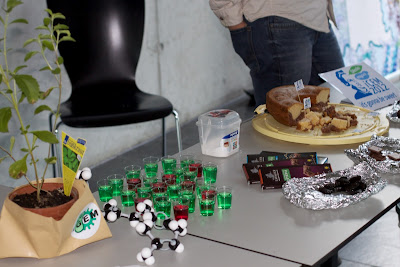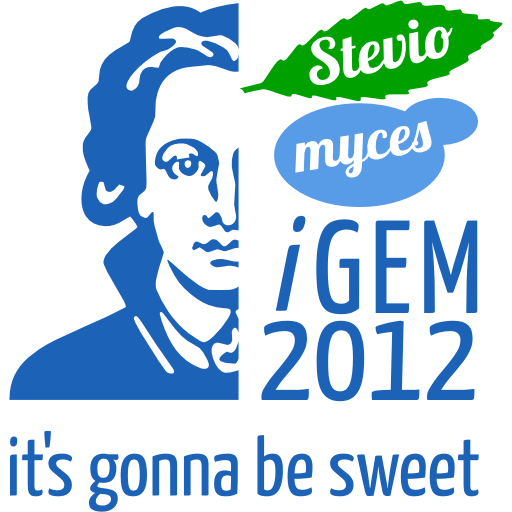Team:Frankfurt
From 2012.igem.org

Welcome to our page and greetings from the Goethe University Frankfurt am Main. We are pleased about your visit of our website. You will find more details about our project using the menu above. We appreciate your critic and comments.
Steviomyces - it's gonna be sweet
Project Description

Therefore, we aim to develop biobricked pathway expressing all necessary genes for rebaudioside A production in common baker's yeast Saccharomyces cerevisae, a well known, safe organism used in food production for millenia. As a precursor for the diterpene steviol is geranylgeranyl pyrophosphate (GGPP), an intermediate of the mevalonate pathway and the steroid metabolism, we plan to overexpress certain key enzymes of this pathway in order to create a favorable amount of educts for steviol biosynthesis, as literature research hinted at this particular bottleneck. Furthermore, we aim to clone, biobrick and express the enzymes for a bifunctional cyclase from Gibberella fujikuroi catalyzing a two step cyclisation from GGPP to ent-kaurene, the ent-kaurene oxidase, as well from Gibberella fujikuroi, catalyzing the reaction from ent-kaurene to ent-kaurenoic acid, and a ent-kaurenoic acid hydroxylase from Stevia rebaudiana, catalyzing the final step producing steviol. Finally, we will try to introduce certain uracil-glycosil transferases (UGTs) from Stevia rebaudiana, catalyzing various glycosilation reactions necessary to produce rebaudiosides. As one UGT believed to be necessary for rebaudioside A production is not yet known, we might conduct experiments to find this particular UGT or a viable substitute.
Basing upon a microorganism producing stevia sweetener, other problems such as purification and product recovery might be improved biotechnologically. Furthermore, the biobricks for stevia production can be used in other organisms and for other applications.
Aims and Achievements of our Project
In our participation in the 2012 iGEM Competition we were able to successfully test the gen assembly method via gap repair cloning and construct a plasmid for increased Geranylgeranyl Pyrophosphate production and transformed it into yeast. We presented our idears to the general, professional and university public and discussed them both with regard to technical, social and ethical implications. Last but not least we were able to gain financial, technical and administrative support and overcame the obstacles to create an iGEM Team for the first time at our institution. We are planning to establish the iGEM competition as an fixed part of the educational proposals at the Goethe University.
Regrettably we were not able to conduct many biochemical trials to investigate the function of our gen cassette. We are going to concetrate on those biochemical methods in the next years competition. For that purpose we will try to analyze the metabolome of our modified pathways and do protein assays. Additionally we want to create the final steps to Steviol in yeast and also give some attention in the production of different Diterpene compounts.
| Home | Team | Project | Organisms | New Yeast RFC | Notebook | Registered Parts | Modeling | Safety | Attributions | Official Team Profile |
|---|
 "
"
